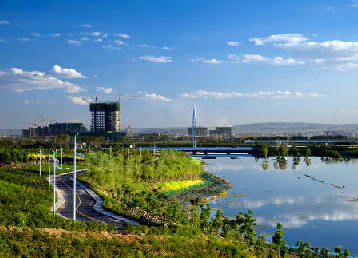Building a green Silk Road is a common responsibility
- By Li Wuzhou & Zhou Lin
 0 Comment(s)
0 Comment(s) Print
Print E-mail China Today, January 12, 2016
E-mail China Today, January 12, 2016
Multiple ecological development forces
Sha raised several recommendations for consideration. The first was to speed up the establishment of an exchange and cooperation mechanism to strengthen ecological construction. To this end, we must constantly strengthen dialogue, exchanges, and pragmatic cooperation with countries along the Belt and Road on ecological civilization, and set up an effective cooperation mechanism with a view to establishing a global coalition of ecological governance. In particular, it is vital to establish platforms like the Kubuqi International Desert Forum where countries can share ecological management experience, showcase ecological management technologies, scale up successes in green civilization, and increase green aid for ecologically fragile countries.
Second, we should continue to strengthen technological cooperation towards developing ecological industries. "Ecological development requires technological support. Ecologically fragile areas should be encouraged to learn from advanced ecological management expertise and experience, to introduce and create large scale innovative eco-technologies, and to apply them to basic productive sectors, especially water-saving agriculture, smart animal husbandry, and integrated ecological industries. Such integrated approaches will allow for habitat restoration while achieving food self-sufficiency. They will also help eradicate poverty and to escape the vicious cycle of conflict between people and land. All this will achieve win-win ecological and economic results," Sha said.
He hence proposes establishing ecological restoration demonstration bases or special ecological-economic zones in ecologically fragile areas. After a trial period, successful experiences can be disseminated throughout areas along the Silk Road.
Multiple forces should be encouraged to participate in Silk Road ecological development, "This is not just state behavior in Silk Road countries; it is more important still to encourage social forces, especially enterprises, to participate in ecological development," Sha said. Leading ecological development enterprises, such as the Elion Resources Group, have indeed displayed a strong sense of social responsibility. They should proactively implement the "going global" strategy, participate on a larger wider and higher scale in international exchanges and cooperation on ecological development, and promote ecological and economic integration along the Silk Road.
We should seek to develop ecological culture and popularize the concept of ecological civilization. "I propose carrying out various forms of ecological civilization outreach activities in the Silk Road countries, particularly those in ecologically fragile areas, to create a strong ethos of ecological civilization, raise ecological awareness, and make the building of ecological civilization a conscious action along the Silk Road," Sha said.
Raising ecological awareness, he believes, is also relevant to governments. "In 1992, we witnessed three outcomes: first, the United Nations Framework Convention on Climate Change; second, the Convention on Biological Diversity; and third, the Dialogues among United Nations. We should work hard together and make a joint effort towards new achievements."
 |
|
The Bawang River in Ulanqab after undergoing water regulation and control. |
Relive the glorious history of the ancient Silk Road
The rise and fall of the ancient Silk Road is in fact a history of ecological evolution. The advancement and implementation of the Belt and Road Initiative makes building an ecological civilization a vital strategic link. That we should build an ecological Silk Road and a Green Silk Road is also the consensus of countries along it. "I believe that through coordination, the ancient Silk Road will indeed be able to realize Green Value, so achieving more human benefits and rekindling its glorious history," Sha said.
Last September the United Nations convened a summit on the post-2015 development agenda, which entails implementation of the Sustainable Development Goals (SDGs). The emphasis is on balanced economic, social, and environmental development – the three pillars of sustainable development.
The post-2015 development agenda has also established a broader and stronger global development partnership, so energizing international development cooperation.
Goal 15 provides that member states "Protect, restore and promote sustainable use of terrestrial ecosystems, sustainably manage forests, combat desertification, halt and reverse land degradation, and halt biodiversity loss." The UN also calls upon the international community, "by 2020, [to] combat desertification, and restore degraded land and soil, including land affected by desertification, drought and floods, and strive to achieve a land-degradation neutral world."



 Add your comments...
Add your comments...

